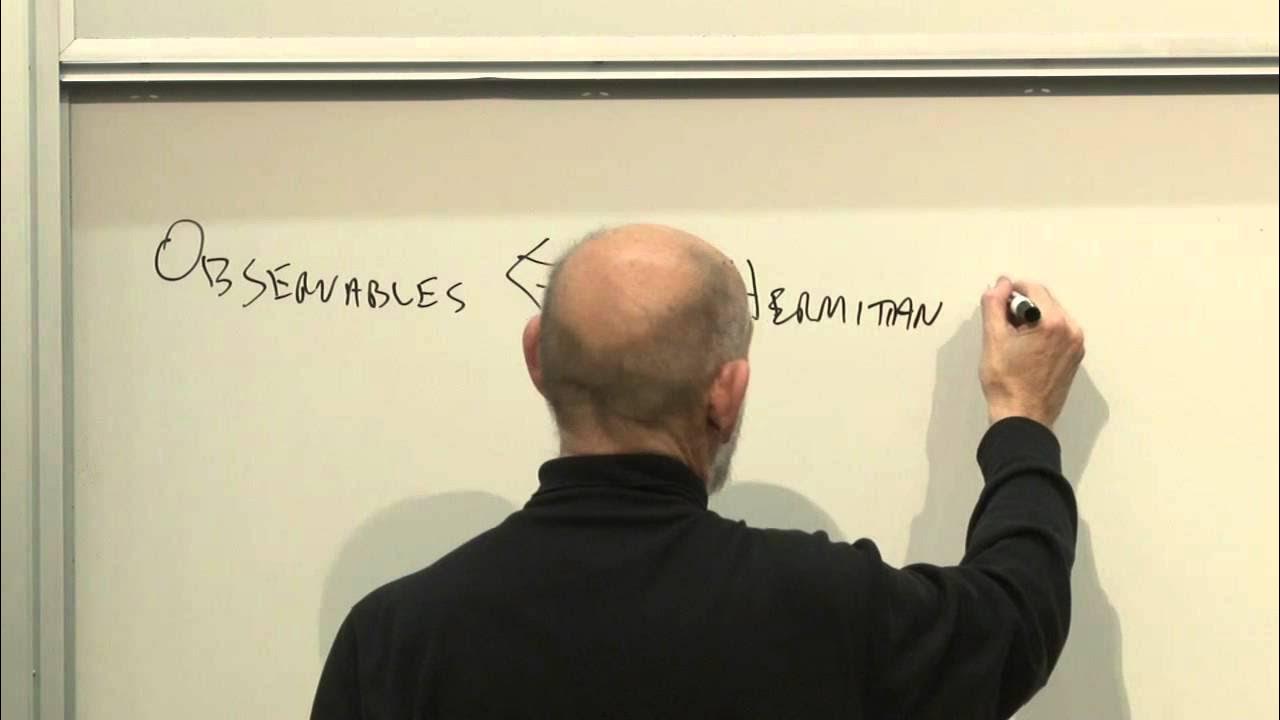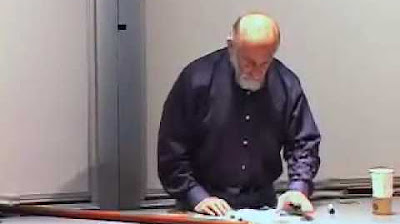Ch 3: Why do we need a Hilbert Space? | Maths of Quantum Mechanics
TLDRIn this episode, the concept of a vector space in quantum mechanics is explored, focusing on the infinite dimension of quantum state space. The discussion highlights the potential pitfalls of introducing infinity into linear algebra, using the example of polynomials to illustrate how infinite linear combinations can lead outside the vector space. The solution is introduced as a Hilbert space, which ensures that every convergent sum of vectors remains within the space, thus maintaining the integrity of quantum states in infinite superpositions. The importance of a Hilbert space in quantum mechanics is emphasized for accurately representing quantum states without resulting in absurd outcomes.
Takeaways
- 🌌 Quantum states are represented by ket vectors in a vector space.
- 🔄 Quantum states can be a linear combination of all possible outcome states for a physical quantity.
- ∞ The list of outcome states for a quantum state may be infinite, suggesting an infinite-dimensional vector space.
- 🚫 Infinite combinations can lead to issues, as adding infinities to linear algebra can produce unexpected results.
- 📈 The vector space of polynomials over real numbers serves as an example to illustrate the pitfalls of infinite combinations.
- 🅿️ The Taylor series for e^x demonstrates that infinite linear combinations can result in something outside the original vector space.
- 💡 Infinity is a concept, not a number, and its introduction into a vector space must be handled with care.
- 🛑 The risk of infinite vectors in a quantum vector space is that they might not represent valid quantum states.
- 🏠 To address this, quantum vector spaces are considered Hilbert spaces, where every convergent sum converges to an element within the space.
- 🔄 A Hilbert space is complete, including the 'edge' of the vector space where infinite combinations converge.
- 🔑 The inner product is the next key concept in quantum mechanics, which will be discussed in the following episode.
Q & A
What is the main concept discussed in this episode?
-The main concept discussed in this episode is the idea of a vector space in quantum mechanics, specifically focusing on the dimension of the quantum vector space and the introduction of Hilbert space.
How are quantum states represented in the vector space?
-Quantum states are represented by a ket vector in the vector space.
What does a linear combination of all possible outcome states represent?
-A linear combination of all possible outcome states represents the quantum state for any physical quantity.
What is the significance of the dimension of a vector space in quantum mechanics?
-The dimension of a vector space in quantum mechanics is significant because it determines the number of vectors needed to form a basis, which in turn affects how we describe quantum states.
Why is it important to be careful when introducing infinities into our theory?
-It is important to be careful when introducing infinities because they can lead to unexpected results, such as ending up with something completely outside the vector space, as illustrated by the example of the Taylor series for e^x.
What is a Hilbert space?
-A Hilbert space is a vector space equipped with an inner product that is Cauchy complete, meaning every convergent sequence of vectors converges to an element inside the vector space.
What does Cauchy completeness imply for a vector space?
-Cauchy completeness implies that every convergent sequence of vectors in the vector space converges to an element within the space, ensuring that the vector space does not have any 'gaps' that could be reached by infinite linear combinations.
Why is using a Hilbert space beneficial in quantum mechanics?
-Using a Hilbert space is beneficial in quantum mechanics because it allows for the use of infinite dimensional vector spaces while ensuring that the results of infinite operations, like linear combinations, remain within the space and do not produce nonsensical outcomes.
What is the role of the inner product in a Hilbert space?
-The inner product in a Hilbert space is a generalized dot product that plays a crucial role in defining the space and will be discussed in more detail in the next episode.
How does the concept of a basis relate to the dimension of the quantum vector space?
-The concept of a basis relates to the dimension of the quantum vector space because the basis consists of the set of vectors that can be combined linearly to form any other vector in the space, and the number of vectors in the basis determines the dimension of the space.
What is the significance of the example with polynomials and the Taylor series for e^x in the discussion of quantum vector spaces?
-The example with polynomials and the Taylor series for e^x illustrates the potential pitfalls of infinite operations in vector spaces. It shows that without proper constraints, infinite linear combinations can lead to results outside the original space, which is a problem that needs to be addressed when dealing with quantum states.
Outlines
🌌 Quantum States and Infinite Dimensions
This paragraph introduces the concept of a vector space in quantum mechanics, focusing on the representation of particle quantum states by ket vectors. It discusses the idea that quantum states can be a linear combination of all possible outcome states for a physical quantity, potentially infinite in number. The key question posed is the dimension of this vector space, which is the number of vectors needed to form a basis. The paragraph suggests that the basis could be infinite, leading to an infinite-dimensional vector space. It also cautions about the careful handling of infinities in theoretical constructs, using the example of polynomial vector spaces and the surprising result of infinite linear combinations leading to e^x, which is not a polynomial. The paragraph emphasizes the importance of understanding the implications of infinity in vector spaces.
🚫 Risks of Infinite Vector Spaces
The second paragraph delves into the risks associated with introducing infinity into vector spaces, particularly in the context of quantum mechanics. It explains that if a quantum state is in an infinite superposition of outcome states, it might lie outside the vector space, invalidating it as a quantum state. To address this issue, the concept of a Hilbert space is introduced, which is a vector space with an inner product that is Cauchy complete. This means that every convergent sequence of vectors converges to an element within the Hilbert space, ensuring that infinite linear combinations remain within the space. The paragraph provides a visual analogy of a Hilbert space as including the 'edge' of the vector space, making it complete. The importance of using a Hilbert space in quantum mechanics is highlighted to avoid nonsensical results when combining an infinite number of kets. The paragraph concludes by committing to use a Hilbert space for quantum vector spaces and teases the next episode's topic: the inner product, a crucial tool in quantum math.
Mindmap
Keywords
💡Vector Space
💡Kets
💡Linear Combination
💡Basis
💡Infinite Dimension
💡Hilbert Space
💡Inner Product
💡Cauchy Complete
💡Quantum State
💡Taylor Series
💡Superposition
Highlights
The concept of a vector space in quantum mechanics was formalized, with an emphasis on kets representing particle quantum states.
Quantum states are linear combinations of possible outcome states for physical quantities, potentially forming an infinite list.
The dimension of the quantum vector space is discussed, with the possibility of it being infinite based on the infinite combination of outcome states.
The importance of understanding infinite dimensions in linear algebra for describing particles is highlighted.
An example of the vector space of polynomials over real numbers is used to illustrate the issues with infinite linear combinations.
The Taylor series for e^x is shown to result from an infinite linear combination of polynomials, leading to a function outside the original vector space.
The concept of infinity as a limit, rather than a number, is introduced to explain the subtleties of working with infinite sums.
The risk of introducing infinity into a vector space is emphasized to avoid ending up with non-sensical results.
A solution to the problem is proposed by requiring that every convergent sum of vectors must converge to an element inside the vector space.
The concept of a Hilbert space is introduced as a vector space with an inner product that is Cauchy complete.
An inner product is described as a generalized dot product, which will be discussed in more detail in the next episode.
Cauchy completeness is explained as the property where every convergent sequence of vectors converges to an element within the vector space.
A visual intuition of a Hilbert space is provided, comparing it to a vector space that includes its edge, making it 'complete'.
The use of a Hilbert space in quantum mechanics is justified as a way to handle infinite dimensional vector spaces without contradictions.
The quantum vector space is henceforth considered to be a Hilbert space, denoted as H, where all quantum states reside.
The next episode will focus on the inner product, which is a crucial tool in quantum mathematics.
Transcripts
Browse More Related Video

Ch 2: What are kets and wavefunctions? | Maths of Quantum Mechanics

Lecture 2 | The Theoretical Minimum

Ch 6: What are bras and bra-ket notation? | Maths of Quantum Mechanics

Lecture 3 | The Theoretical Minimum

Lecture 2 | Quantum Entanglements, Part 1 (Stanford)

Ch 7: How are observables operators? | Maths of Quantum Mechanics
5.0 / 5 (0 votes)
Thanks for rating: